In this thoughtful Ted Talk Hasan Kwame Jeffries emphasises the need to weave historical context, no matter how painful, into our understanding of modern society so we can disrupt the continuum of inequality massively affecting marginalised communities. Sometimes to move forward society must look back and confront the difficult history that has shaped widespread injustice.
Tag Archives: #History
Popular History Books of Our Time
This isn’t your usual history book list. In fact, some of the books aim to give us quite a different view of what we have learned previously. Which is why we really enjoy them. It’s easy to forget that history books aren’t just books brimming with facts of bygone eras, but rather we can consider them stories of events to be questioned, viewed from different angles and full of scandal and intrigue.
SPQR by Mary Beard
Hailed by critics as animating and with a wonderful ability to bring the past to life in a way that makes your hair stand on end, SPQR spans nearly a thousand years of history. Mary Beard narrates and examines not just how we think of ancient Rome but challenges the comfortable historical perspectives that have existed for centuries. With its nuanced attention to class, democratic struggles, and the lives of entire groups of people omitted from the historical narrative for centuries, SPQR will to shape our view of Roman history for decades to come.
Headstrong by Rachel Swaby
Headstrong delivers a powerful and entertaining response to the question: Who are the role models for today’s female scientists? Covering Nobel Prize winners and major innovators, as well as lesser-known but hugely significant scientists who influence our every day, these engaging profiles span centuries of courageous thinkers and illustrate how each subject’s ideas developed, from their first moment of engagement with science through the research and discovery for which they’re best known. Finally, it gives these 52 lives the attention and respect they deserve with the aim to encourage and inspire a new generation of girls to put on their lab coats.
Sapiens by Dr. Yuval Noah Harari
Dr. Yuval Noah Harari makes serious non-fiction cool again.
One hundred thousand years ago, at least six different species of humans inhabited Earth. Yet today there is only one: homo sapiens. What happened to the others? And what may happen to us? Most books about the history of humanity pursue either a historical or a biological approach, but Dr. Yuval Noah Harari breaks the mold with this highly original book that begins about 70,000 years ago with the appearance of modern cognition. From examining the role evolving humans have played in the global ecosystem to charting the rise of empires, Sapiens integrates history and science to reconsider accepted narratives, connect past developments with contemporary concerns, and examine specific events within the context of larger ideas. Dr. Harari also compels us to look ahead, because over the last few decades humans have begun to bend laws of natural selection that have governed life for the past four billion years. We are acquiring the ability to design not only the world around us, but also ourselves. Where is this leading us, and what do we want to become?
You can view Dr. Yuval Noah Harari’s other books here.
Guns, Germs and Steel by Jared Diamond
Drawing together ideas from history, geography, economics and anthropology, Guns, Germs and Steel offers compelling theories and surprising insights into the development of societies, it is a hugely influential book that helped to establish Popular Science as a genre. Jared Diamond examines why some civilisations are more successful than others, in terms of wealth and political power, despite no inherent advantage in genetics or intelligence. He theorises that the tools of success are guns (superior weapons for military might); germs (Eurasian diseases weakening local populations, making them easier to conquer) and steel (advanced technology facilitating imperialism) and that they all arose from environmental conditions that allowed early adoption of agriculture.
A Short History of Nearly Everything by Bill Bryson
Bill Bryson describes himself as a reluctant traveller, but even when he stays safely at home he can’t contain his curiosity about the world around him. A Short History of Nearly Everything is his quest to understand everything that has happened from the Big Bang to the rise of civilisation, how we got from there, being nothing at all, to here, being us. Bill Bryson’s challenge is to take subjects that normally bore the pants off most of us, like geology, chemistry and particle physics, and see if there isn’t some way to render them comprehensible to people who have never thought they could be interested in science. The ultimate eye-opening journey through time and space, A Short History of Nearly Everything reveals the world in a way most of us have never seen it before.
You can see a list of Bill Bryson’s other books here.
The History of the Ancient World by Susan Wise Bauer
Susan Wise Bauer presents us with a lively and engaging narrative history showing the common threads in the cultures that gave birth to our own. This is the first volume in a series that tells the stories of all people, connecting historical events from Europe to the Middle East to the far coast of China, while still giving weight to the characteristics of each country. Susan Wise Bauer provides both sweeping scope and vivid attention to the individual lives that give flesh to abstract assertions about human history. Dozens of maps provide a clear geography of great events, while timelines give the reader an ongoing sense of the passage of years and cultural interconnection. This old-fashioned narrative history employs the methods of “history from beneath” literature, epic traditions, private letters and accounts to connect kings and leaders with the lives of those they ruled. The result is an engrossing tapestry of human behaviour from which we may draw conclusions about the direction of world events and the causes behind them.
You can see more of Susan Wise Bauer’s work here.
Enjoy!
Looking into the world’s greatest scandals
One thing about scandals: they sell. We, as a society, take great pleasure in reading about how someone ‘got away’ with behaviour that breached social codes or pleasure at being caught. A scandal can pretty much guarantee a best seller, as most of these titles will attest to. Here are our recommendations for the best page-turning reads about some of the world’s greatest scandals:
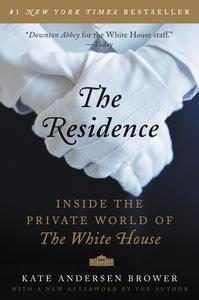 The Residence: Inside the Private World of The White House by Kate Anderson Brower
The Residence: Inside the Private World of The White House by Kate Anderson Brower
132 rooms, 35 bathrooms, 28 fireplaces, three elevators, eight staircases. No-one knows the inner workings of the White House like the maids, butlers, florists and Chefs who work there. This book contains intimate accounts of life working with First families from the glamorous Kennedys, the conflict-ridden Clintons to Barack and Michelle Obama. Written by former White House Correspondent Kate Anderson Brower, the New York Times Bestseller was written based on hundreds of hours of interviewing staff who served the families who served America.
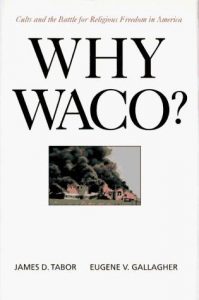 Why Waco? by James D. Tabor
Why Waco? by James D. Tabor
In 1993, the Government launched an assault on a Branch Davidian religious cult near Waco, Texas that resulted in 80 deaths, including 17 children. Whether this tragedy was avoidable is still debated. The impact of this event, however, has had far-reaching implications for religious freedom in Texas.
Considered to be the most comprehensive account of the event, Tabor and Gallagher provide a detailed study of the Davidian movement and theology and uncover distorted media reports of the siege.
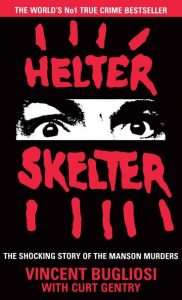 Helter Skelter by Vincent Buglioso
Helter Skelter by Vincent Buglioso
The true story behind the most infamous mass murder case ever and its perpetrator, the notorious criminal Charles Manson. On August 9th 1969, seven people were found shot, stabbed and bludgeoned to death in Los Angeles. America watched in fascinated horror as the killers were tried and convicted. But the real questions went unanswered. How did Manson make his ‘family’ kill for him? What made these young men and women kill again and again with no trace of remorse? Did the murders continue even after Manson’s imprisonment? No matter how much you think you know about this case, this book will still shock you.
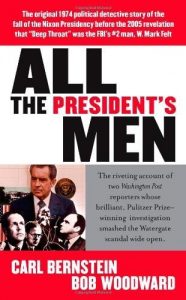 All the President’s Men by Carl Bernstein and Bob Woodward
All the President’s Men by Carl Bernstein and Bob Woodward
Possibly one of the biggest political scandals in history, Watergate was the break-in that occurred at the Democratic National Committee and Richard Nixon’s administration’s cover up of their involvement. Bernstein and Woodward were reporters at the Washington Post who uncovered the story. The book details the investigation by the authors and is a non-fiction account of one of the finest examples in political investigative journalism. The book reveals some of the murky aspects of the US Government and is an excellent, first hand insight into one of the most significant historic events in modern politics.
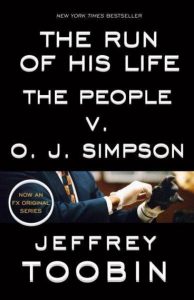 The Run of His Life: The People Vs OJ Simpson by Jeffrey Toobin
The Run of His Life: The People Vs OJ Simpson by Jeffrey Toobin
Toobin was a lawyer turned reporter who covered the infamous trial based on leaks provided to him by the Simpson defence team. This is an eye-opening, behind-the-scenes look at the “crime of the century” and the legal proceedings that followed sheds new light on the arrest and trial of O. J. Simpson, the evidence in the case, and the role of the prosecution and defence teams.
It also shows how racial events in the years prior, such as the Rodney King beating and riots were used cleverly by Simpson’s team to lead to his acquittal.
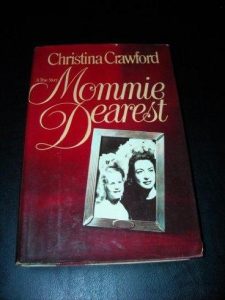 Mommie Dearest by Christina Crawford
Mommie Dearest by Christina Crawford
Christina Crawford was the adopted daughter of Box Office queen Joan Crawford. Yet, Christina’s anger at the discrepancies between Joan’s public vs private persona bubbled over a year after she died. ‘Mommie Dearest’ was scandalous to the Hollywood set due to it’s portrayal of Joan as an abusive, mentally ill and alcoholic mother. One of the first ‘tell-all’ stories, what it lacks in literary depth, it makes up for in its page-turning plot.





